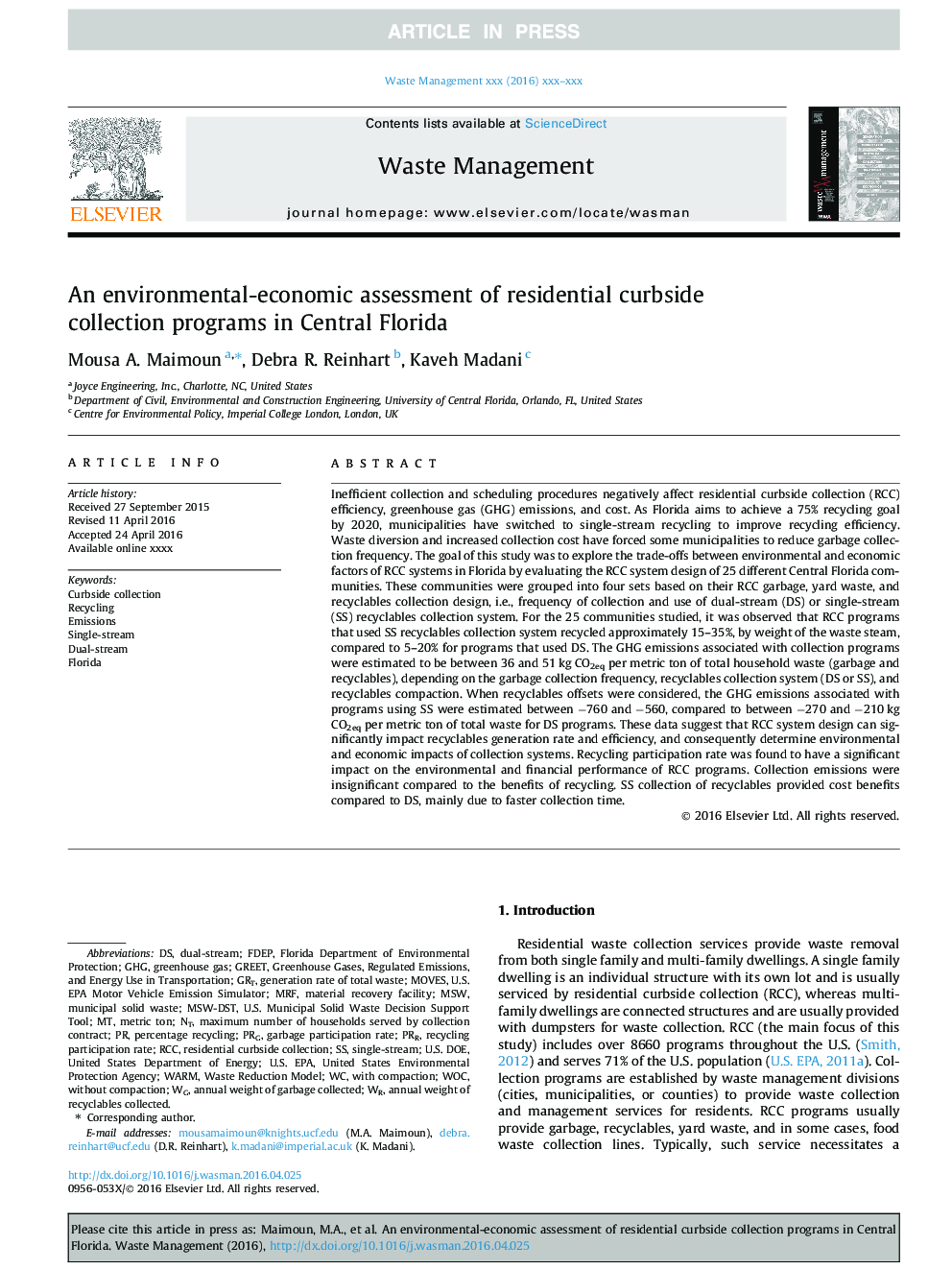| کد مقاله | کد نشریه | سال انتشار | مقاله انگلیسی | نسخه تمام متن |
|---|---|---|---|---|
| 6353592 | 1622632 | 2016 | 12 صفحه PDF | دانلود رایگان |
عنوان انگلیسی مقاله ISI
An environmental-economic assessment of residential curbside collection programs in Central Florida
ترجمه فارسی عنوان
ارزیابی زیست محیطی برنامه های جمع آوری مسکن در فلوریدا مرکزی
دانلود مقاله + سفارش ترجمه
دانلود مقاله ISI انگلیسی
رایگان برای ایرانیان
کلمات کلیدی
FDEPGRTWOCGHGPrGMSWMRFRCCPRRU.S. EPAUnited States Environmental Protection Agency - آژانس حفاظت از محیط زیست ایالات متحدهMaterial recovery facility - امکانات بازیابی موادEmissions - انتشاراتRecycling - بازیافتmetric ton - تن متریک یا تن هزار کیلوییMOVES - حرکت می کندMunicipal solid waste - زباله جامد شهریGREET - سلامFlorida - فلوریداCurbside collection - مجموعه کورسبیUnited States Department of Energy - وزارت انرژی ایالات متحدهGreenhouse gas - گاز گلخانه ایGreenhouse Gases, Regulated Emissions, and Energy Use in Transportation - گازهای گلخانه ای، انتشار گازهای گلخانه ای و استفاده از انرژی در حمل و نقلWARM - گرما
موضوعات مرتبط
مهندسی و علوم پایه
علوم زمین و سیارات
مهندسی ژئوتکنیک و زمین شناسی مهندسی
چکیده انگلیسی
Inefficient collection and scheduling procedures negatively affect residential curbside collection (RCC) efficiency, greenhouse gas (GHG) emissions, and cost. As Florida aims to achieve a 75% recycling goal by 2020, municipalities have switched to single-stream recycling to improve recycling efficiency. Waste diversion and increased collection cost have forced some municipalities to reduce garbage collection frequency. The goal of this study was to explore the trade-offs between environmental and economic factors of RCC systems in Florida by evaluating the RCC system design of 25 different Central Florida communities. These communities were grouped into four sets based on their RCC garbage, yard waste, and recyclables collection design, i.e., frequency of collection and use of dual-stream (DS) or single-stream (SS) recyclables collection system. For the 25 communities studied, it was observed that RCC programs that used SS recyclables collection system recycled approximately 15-35%, by weight of the waste steam, compared to 5-20% for programs that used DS. The GHG emissions associated with collection programs were estimated to be between 36 and 51Â kg CO2eq per metric ton of total household waste (garbage and recyclables), depending on the garbage collection frequency, recyclables collection system (DS or SS), and recyclables compaction. When recyclables offsets were considered, the GHG emissions associated with programs using SS were estimated between â760 and â560, compared to between â270 and â210Â kg CO2eq per metric ton of total waste for DS programs. These data suggest that RCC system design can significantly impact recyclables generation rate and efficiency, and consequently determine environmental and economic impacts of collection systems. Recycling participation rate was found to have a significant impact on the environmental and financial performance of RCC programs. Collection emissions were insignificant compared to the benefits of recycling. SS collection of recyclables provided cost benefits compared to DS, mainly due to faster collection time.
ناشر
Database: Elsevier - ScienceDirect (ساینس دایرکت)
Journal: Waste Management - Volume 54, August 2016, Pages 27-38
Journal: Waste Management - Volume 54, August 2016, Pages 27-38
نویسندگان
Mousa A. Maimoun, Debra R. Reinhart, Kaveh Madani,
